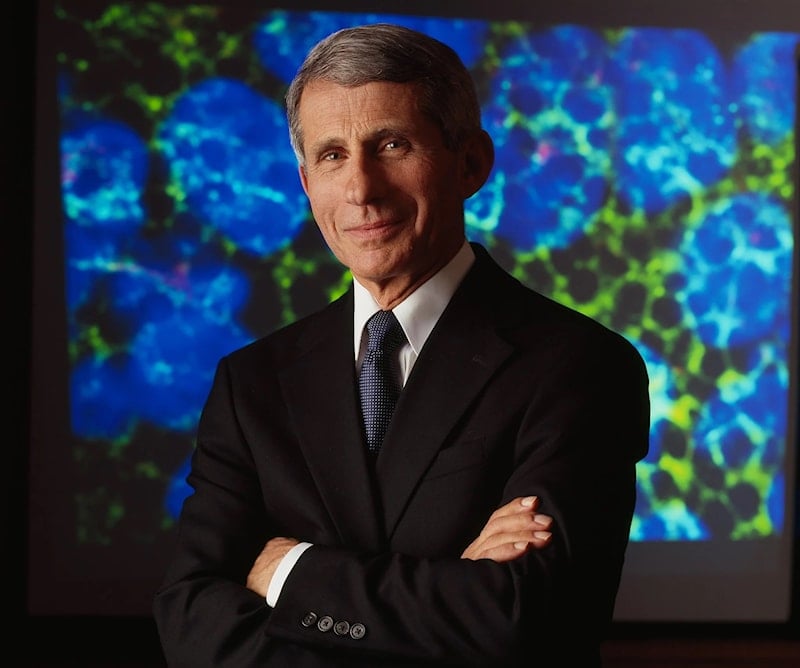Fauci’s agency pays $9.8 M last year for Monkeypox treatment test
Given the virus' recent outbreak, some dubbed the timing "curious".
-

The head of the National Institute of Allergy and Infectious Diseases (NIAID), Dr. Anthony Fauci
The National Institute of Allergy and Infectious Diseases (NIAID), led by Dr. Anthony Fauci, paid $9.8 million to government researchers last year to develop a treatment for Monkeypox, according to the National Pulse.
The investigation began on September 28, 2020, and will end on September 27, 2025, according to the National Institutes of Health (NIH), which supervises the NIAID. Its purpose is to conduct a "randomized, placebo-controlled trial of the safety and efficacy of tecovirimat for the treatment of Monkeypox virus disease." It is unknown whether the grant included any payments in 2020.
The NIAID awarded the grant to the Frederick National Laboratory for Cancer Research, a federally funded research and development center in Frederick, Maryland, supported by the National Cancer Institute.
Read next: WHO: 780 global monkeypox cases
According to the grant abstract:
“The similarity between Monkeypox and the variola [smallpox] virus, coupled with concerns about the potential of the variola virus as a potential bioterrorism agent, have placed Monkeypox treatments at the forefront of public health and scientific research agendas in many countries.”
SIGA Technologies Inc. stated on May 25 that it has acquired FDA approval for an intravenous formulation of the antiviral tecovirimat (named TPOXX) for the treatment of smallpox. Despite the fact that smallpox was eradicated in 1980, the medication was created in case smallpox was employed as a bioweapon.
TPOXX oral formulation has been approved for treating smallpox in the United States, Canada, and Europe, and it has also been approved for treating Monkeypox and cowpox in Europe.
Read next: 'Tomato flu' outbreak causes panic due to monkeypox-like symptoms
According to The National Pulse, as of May 30, the NIH research had produced no publicly available studies, articles, or patents.
The timing of the award is "curious", according to the National Pulse because it comes at a time when pharmaceutical corporations like Pfizer and Johnson & Johnson are reaping record profits owing to the COVID-19 pandemic.
The project's primary investigator is Lori Dodd, a mathematical statistician at the NIAID's biostatistics research section.
Briahna Joy Gray and Kim Iversen, co-hosts of The Hill's "Rising", reminded viewers that Dodd was "exposed for her involvement in the agency's reported data altering of remdesivir trials to make [remdesivir] seem more effective against COVID." Both Iversen and Gray also found the timing of the funding suspicious.
“It could just be coincidental,” said Iversen, “ … but I will say that there is something very suspicious about the fact that they started working on identifying treatments for Monkeypox in September of 2020."
Read next: US has biolabs where monkeypox spread in Nigeria: Moscow
However, Gray said, “in a world where everyone’s certainly concerned about viruses because of COVID-19, maybe the money simply started to flow in the fall of 2020.”
“What’s odd,” responded Iversen, “is that there’s now suddenly an outbreak [of Monekypox] and that outbreak is making headlines and it’s spreading all around the world.”
As public dread of Monkeypox develops, Iversen speculated that the NIH may be seeking to create a new therapy.
Others, as The Defender previously reported, questioned how unexpected the Monkeypox outbreak was after learning about a March 2021 tabletop simulation of a possible deadly Monkeypox outbreak forecast to occur in May 2022.
Some observers speculated that the outbreak was caused by gain-of-function studies or other virus-related experiments.
According to the National Pulse, a peer-reviewed article published in February 2022 indicated that scientists conducted a monkeypox-related gain-of-function research project at the Wuhan Institute of Virology in August 2021.
Where did Fauci's money come from?
It is worth mentioning that the unredacted 2020 financial disclosures of Dr. Anthony Fauci, director of the National Institute of Allergy and Infectious Diseases and the Chief Medical Advisor to the US President, were delivered to US Senator Roger Marshall. The announcement came after a heated Senate debate between Fauci and Marshall, in which Fauci referred to Marshall as a "moron".
The financial disclosures contain a plethora of previously unknown data. The Fauci family's net worth exceeds $10.4 million.
During the pandemic year of 2020, their household income, perks and benefits, and unrealized gains totaled $1,776,479, including $868,812 in federal income and benefits, $113,298 in outside royalties and travel perks, and $794,369 in investment accounts.

 4 Min Read
4 Min Read










